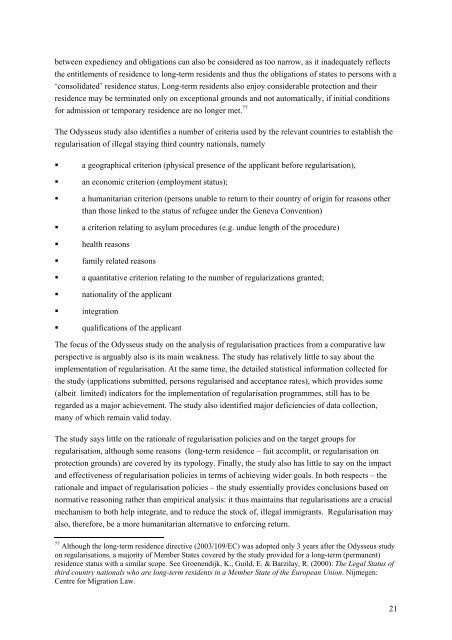REGINE Regularisations in Europe Final Report - European ...
REGINE Regularisations in Europe Final Report - European ...
REGINE Regularisations in Europe Final Report - European ...
Create successful ePaper yourself
Turn your PDF publications into a flip-book with our unique Google optimized e-Paper software.
etween expediency and obligations can also be considered as too narrow, as it <strong>in</strong>adequately reflects<br />
the entitlements of residence to long-term residents and thus the obligations of states to persons with a<br />
‘consolidated’ residence status. Long-term residents also enjoy considerable protection and their<br />
residence may be term<strong>in</strong>ated only on exceptional grounds and not automatically, if <strong>in</strong>itial conditions<br />
for admission or temporary residence are no longer met. 77<br />
The Odysseus study also identifies a number of criteria used by the relevant countries to establish the<br />
regularisation of illegal stay<strong>in</strong>g third country nationals, namely<br />
• a geographical criterion (physical presence of the applicant before regularisation),<br />
• an economic criterion (employment status);<br />
• a humanitarian criterion (persons unable to return to their country of orig<strong>in</strong> for reasons other<br />
than those l<strong>in</strong>ked to the status of refugee under the Geneva Convention)<br />
• a criterion relat<strong>in</strong>g to asylum procedures (e.g. undue length of the procedure)<br />
• health reasons<br />
• family related reasons<br />
• a quantitative criterion relat<strong>in</strong>g to the number of regularizations granted;<br />
• nationality of the applicant<br />
• <strong>in</strong>tegration<br />
• qualifications of the applicant<br />
The focus of the Odysseus study on the analysis of regularisation practices from a comparative law<br />
perspective is arguably also is its ma<strong>in</strong> weakness. The study has relatively little to say about the<br />
implementation of regularisation. At the same time, the detailed statistical <strong>in</strong>formation collected for<br />
the study (applications submitted, persons regularised and acceptance rates), which provides some<br />
(albeit limited) <strong>in</strong>dicators for the implementation of regularisation programmes, still has to be<br />
regarded as a major achievement. The study also identified major deficiencies of data collection,<br />
many of which rema<strong>in</strong> valid today.<br />
The study says little on the rationale of regularisation policies and on the target groups for<br />
regularisation, although some reasons (long-term residence – fait accomplit, or regularisation on<br />
protection grounds) are covered by its typology. F<strong>in</strong>ally, the study also has little to say on the impact<br />
and effectiveness of regularisation policies <strong>in</strong> terms of achiev<strong>in</strong>g wider goals. In both respects – the<br />
rationale and impact of regularisation policies – the study essentially provides conclusions based on<br />
normative reason<strong>in</strong>g rather than empirical analysis: it thus ma<strong>in</strong>ta<strong>in</strong>s that regularisations are a crucial<br />
mechanism to both help <strong>in</strong>tegrate, and to reduce the stock of, illegal immigrants. Regularisation may<br />
also, therefore, be a more humanitarian alternative to enforc<strong>in</strong>g return.<br />
77 Although the long-term residence directive (2003/109/EC) was adopted only 3 years after the Odysseus study<br />
on regularisations, a majority of Member States covered by the study provided for a long-term (permanent)<br />
residence status with a similar scope. See Groenendijk, K., Guild, E. & Barzilay, R. (2000): The Legal Status of<br />
third country nationals who are long-term residents <strong>in</strong> a Member State of the <strong>Europe</strong>an Union. Nijmegen:<br />
Centre for Migration Law.<br />
21
















